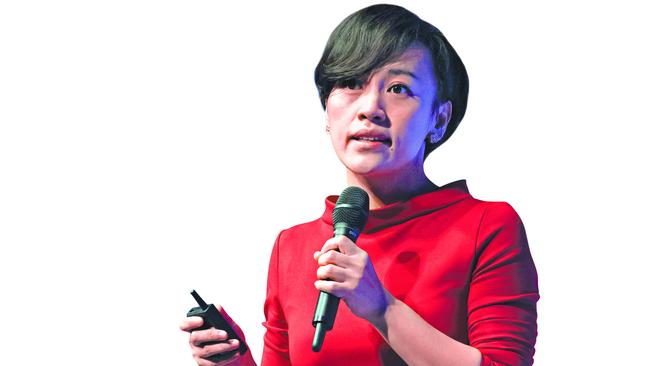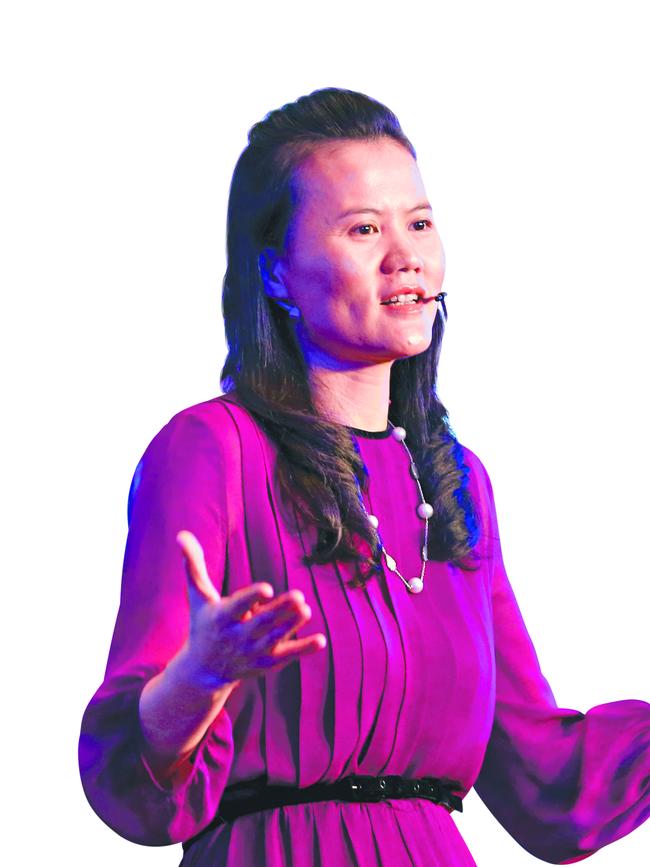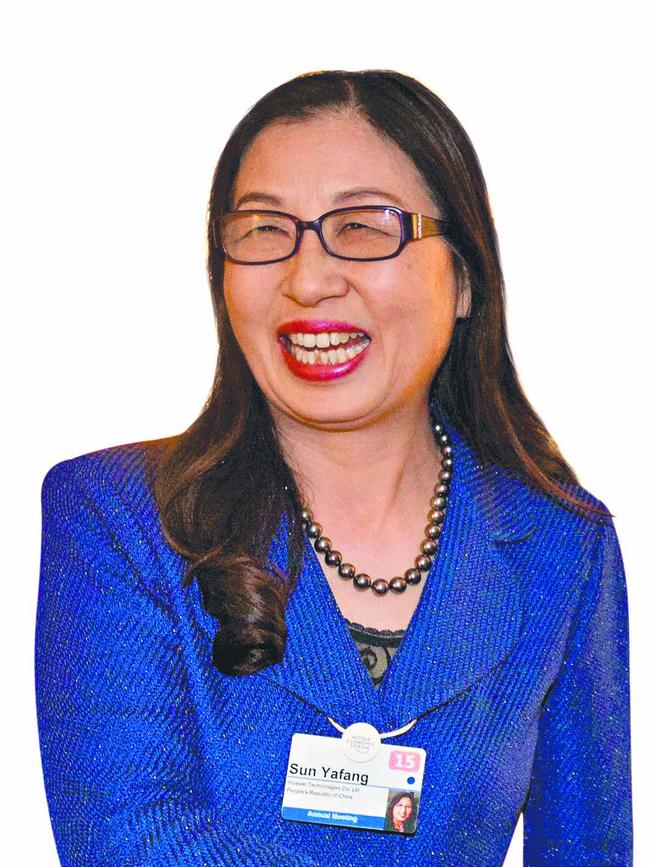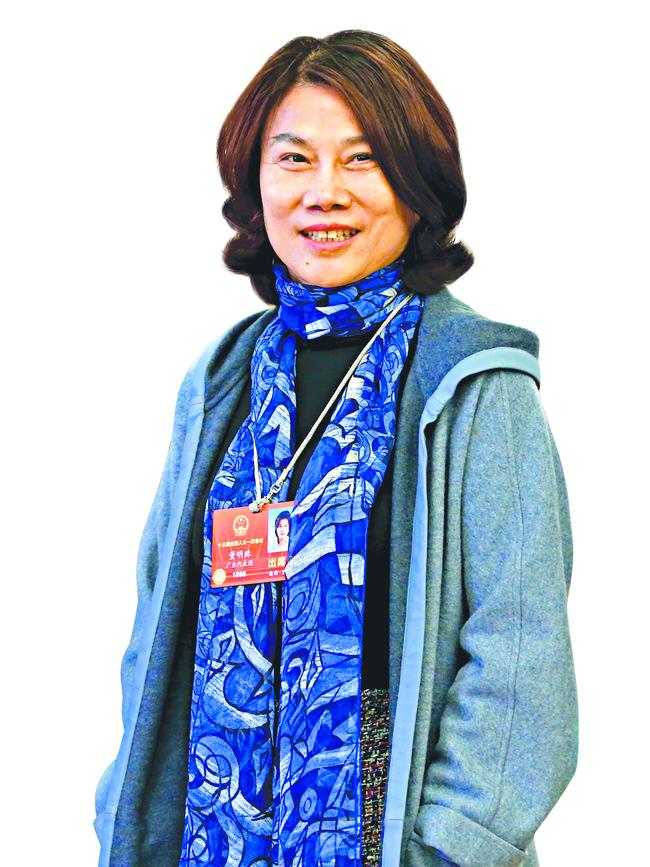Chinese businesswomen Lucy Peng, Jean Liu, Sun Yafang, Jane Sun Jie, Dong Mingzhu, Yang Huiyan
Women are making their mark in Chinese companies, but most of them are happy to keep a low profile.

Lucy Peng is part of the new generation of Chinese women business leaders.
One of the 18 co-founders of Chinese e-commerce giant Alibaba, the 46-year-old Peng is chair of the company’s small business financial arm, Ant Financial, and this year was named chief executive of its South East Asian e-commerce company Lazada.
Peng’s career, and her personal wealth of more than $US1 billion ($1.4067 billion), have been propelled by the explosive growth of China’s e-commerce industry, which has provided new opportunities for talented women in business.
Like Alibaba’s founder, Jack Ma, Peng was a teacher based in Hangzhou, south of Shanghai, before becoming part of the original group, along with her husband, that founded the company in Ma’s apartment in 1999. That decision resulted in her becoming a self-made billionaire after Alibaba was listed on the New York Stock Exchange in 2014. The company now has a market capitalisation of more than $US380 billion.
Peng spent 10 years working in the human resources side of Alibaba, but as the company grew, pioneering e-commerce in China, she was presented with new challenges.
She was chief executive of Alibaba’s payment arm Alipay from 2010 to 2013, overseeing its meteoric rise to become one of China’s biggest online payment platforms.

In 2014, she founded Ant Financial Services, an arm of Alibaba that supports small business. She stepped down as CEO two years later, becoming chair of the business, and this year was appointed a chief executive of the Singapore-based Lazada following Alibaba’s move to invest more than $US4 billion into the company.
Like most wealthy and successful Chinese businesswomen, Peng keeps a low profile and rarely gives interviews, although she was described by a former American employee of Alibaba, Porter Erisman, as a “funny and down-to-earth” leader.
Unlike their counterparts in the West, where successful business figures are often lionised in lengthy media articles, Chinese businesswoman largely prefer to keep a low profile. Living a high-flying public life has its dangers in China, potentially attracting unwanted attention from authorities. An example is the semi-detention and $US130 million in fines and back taxes recently handed out to China’s highest-earning actress, Fan Bingbing, for tax evasion. The 37-year-old Fan could be jailed if she doesn’t pay the fine by the end of the year.
The dynamic growth of the country’s tech and e-commerce sector has generated opportunities for other women in the conservative world of Chinese business.
“Chinese women account for just a fifth of the world’s women but make up 63 per cent of the world’s most successful women entrepreneurs,” says Rupert Hoogewerf, chairman and chief executive of the annual Hurun Report, China’s version of the Rich List. “A lot of people ask me why.”
He credits the opening up of the Chinese economy and “the entrepreneurial spirit of Chinese women”.

Sun Yafang, 63, who topped the Forbes 2018 list of 10 leading businesswomen in China, is chair of Shenzhen-based telecommunications giant Huawei. After studying electronic engineering, she started working as a technician on a television-making company and then as an engineer at the Beijing Research Institution of Communication Technology.
She joined Huawei in 1989 and became its chair in 1999 – like Peng, riding the fortunes of one of China’s most rapidly growing technology companies.
Ranked by Forbes as among the 50 most powerful women in the world, she was one of a group of leading Chinese business people chosen to attend the annual Davos conference in January 2017, which was addressed by President Xi Jinping.
Another high-flyer is Jean Liu, the chair of ride-sharing company Didi Chuxing and daughter of the founder of Chinese computer giant Lenovo.
Liu studied at Peking University and Harvard, and worked for Goldman Sachs Asia for more than a decade before taking up her role at Didi in 2014. There she worked with Didi chief executive Cheng Wei to push US ride-sharing company Uber out of the market.
One of the world’s most valuable start-ups, Didi is estimated to be worth $US56 billion and processes more than 30 million ride-share bookings a day.
Other leading businesswomen in China have also benefited from a Western education. Jane Sun Jie, chief executive of Ctrip, China’s biggest online travel service company, did a bachelor’s degree in business at the University of Florida, before joining US high-tech equipment maker Applied Materials in California. She joined Ctrip in 2005 as its chief financial officer, was promoted to chief operating officer in 2012 and took over as chief executive in 2016.
China’s richest woman is 37-year-old Yang Huiyan, vice chairman of China’s largest property developer, Country Garden. Her father, Yeung Kwok Keung, who co-founded the company, handed over his stake in it in 2005, making his daughter China’s richest woman and its youngest billionaire – she has an estimated net worth of more than $US22 billion.
Yang now owns 57 per cent of Country Garden, which is listed on the Hong Kong Stock Exchange. Although her father says he is training her to become his successor in the business, he is still the company’s chairman and chief executive.

One of the more high-profile businesswomen in China is Dong Mingzhu, the chairwoman and president of Gree Electric Appliances, who comes from a very different background.
Known as the iron lady, the single mother took just 11 years to rise from her beginnings as a saleswoman to become head of China’s top air-conditioning manufacturer. She was recently ranked by Fortune magazine as China’s most powerful woman.
Dong, the youngest of seven children, was born into a working-class family. In 1990, at the age of 36 and recently widowed, she left her three-year-old son with his grandmother in Nanjing and moved to the southern city of Zhuhai, across the border from Macau, to find work. Her success as a salesperson saw her promoted to head of sales in 1994 and attracted the attention of the company’s general manager, Zhu Jianghong, who mentored her.
Dong was made deputy president in 1996 and president in 2001, and has transformed the company into the world’s largest manufacturer of household air-conditioning units.
More public about her personal life than many other Chinese businesswomen, Dong published an autobiography called Regretless Pursuit that became a bestseller in China and was turned into a television series. She is widely known as one of the toughest women in China, declaring that she has almost never had a day off work in her career.
And she has been critical of Chinese women for not pushing themselves more aggressively in their own careers.
“Chinese women are very traditional,” she said in an interview with The New York Times. “Chairman Mao wanted women to hold up half the sky, but few women have changed,” She added, quoting a Chinese proverb: “Most still want to be ‘endearing little birds’.”
Asked about her approach to business, Dong told the newspaper: “You must be a thinker. Be decisive, have good judgment and organisational ability.
“Most importantly, you have to be able to take control. What kind of victory is it when you are given privileges or where you play on your gender?”


To join the conversation, please log in. Don't have an account? Register
Join the conversation, you are commenting as Logout